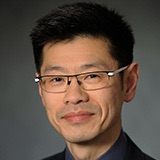Modeling a Contemporary Finance Career Through Data Science
Victor Chen grew up in China but now lives in Toronto, working in finance for a pension fund. He enrolled in Penn’s online Master of Science in Engineering in Data Science (MSE-DS Online) program in Fall 2023, recognizing the importance of technology disciplines, such as data science, to his work. Here, he talks about the role of tech in finance, the flexibility of Penn’s program, and his journey to MSE-DS Online.

What’s your academic background?
I earned my undergraduate degree at McGill University in Montreal. I started with a double major in economics and finance, but then I recognized the importance of having a combined finance and technical background and discovered quant finance industry demand, so I added a major in mathematics. After I graduated in 2022 with a bachelor’s degree, I wanted to continue enhancing my skill set in technology, so I moved to Oxford in the United Kingdom for a master’s degree in mathematical and computational finance.
What got you interested in Penn Engineering’s MSE-DS Online Program?
My Oxford program was accelerated and intensive in nature, with a lot of emphasis on finance, mathematics, and modeling. In the middle of it I realized that, while I was exposed to training in various aspects, I wasn’t diving deep enough into data-driven techniques, such as Python’s applications in deep learning. So I started looking at online degrees and saw that Penn’s MSE-DS Online Program offered courses in deep learning, machine learning, stats and algorithms. I thought those would be good areas to further enhance my skill set, and I appreciated the opportunity to take courses at my own pace.
How’s the program going so far?
So far it has been a great experience. Classes are relatively small, so when I post a question in an online forum, I can expect to get an answer from a TA in just a couple of hours. Also, the course content is closely aligned with emerging trends in the field, which is especially important in data science where the technology is developing so fast.
What sets MSE-DS Online apart from other degree programs?
Even though the degree is still relatively new, the school has already built a lot of online infrastructure and resources for students. In my experience, there’s never been a time that a course I wanted to take was already filled. That shows me that Penn provides a lot of support from professors and teaching staff.
The second thing is, Penn is an Ivy League school, so the academics are outstanding. It’s also a more innovative and affordable program than others.
Finally, it’s a very flexible program. Other programs can be very restrictive in the number of classes you can take at a time. At Penn, you have the option of choosing the number of courses you take. That means you can have a flexible journey.
How are you balancing your time commitments between work and school?
I work full time for a pension fund in Toronto, so it helps a lot that MSE-DS Online gives me the flexibility to take just one course at a time. That way I can really focus on what I’m learning without disrupting my career. And I’ve set up a weekly schedule that helps me stay on track. From Monday to Wednesday I read through the class material and watch the recordings to understand the concepts. Then on Thursday and Friday, I do the homework to further my understanding.
Asynchronous classes are very helpful too, because I can always go back to the recording to see what I might have missed. That’s when I take further notes, which helps me prepare for midterms and final exams.

Have you found ways to apply what you’re learning to your work?
Absolutely. My Python skills have already been useful for me in my work at the pension fund in terms of automating spreadsheets and analysis and deriving additional insights from the investment perspective. Everything is intertwined, and Python is a useful tool to help portfolio managers to make better-informed decisions. I’ve only been in the program for a couple of months, and I’m already applying what I’m learning.
What is it about data science that drew you in?
What gets me really excited about data science is that it’s so applicable to so many disciplines and fields.
It’s a tool that helps to transform your ideas through a model, and then you use this empirical evidence to support your decision process in investment or to facilitate other efficiencies. It’s amazing to see how data science can be used in a very particular discipline — in my case, finance — and it gets me excited to learn more about deep learning, machine learning and natural language processes.
What’s next for you?
I want to stay in the finance industry, but with more of a focus in the quant finance side or the quant investment science side. I’m also thinking about pivoting back to London. Toronto is a major financial center, but even so, London has a much larger financial market. That means there are a lot of hedge funds and major investment banks that are looking for skill sets in fields like data science and modeling rather than pure finance or investment knowledge.
What advice do you have for new MSE-DS Online students?
I would encourage new students to find a good balance between foundational or required courses and electives. Start with foundational courses, then move on to electives that are beneficial to your career.
My other recommendation is to take it slowly. Even if you have a full-time position, one class per semester should be affordable and manageable. Taking it slowly and enjoying your journey will be most beneficial in the end.
Interested in learning more about the online Master of Science in Engineering in Data Science (MSE-DS Online) program? EXPLORE MORE to find information about academics, admissions, FAQs, and more.
“I’ve always had a deep commitment to expanding access to education and knowledge on a global scale. I’ve also had a long-standing research interest in how data science can inform innovations in many different disciplines, from science and medicine to law and finance. That’s why I’m so excited to be part of Penn Engineering Online’s newest degree program.”
Read more HERE from James C. Gee, MSE-DS Online Program Director.

